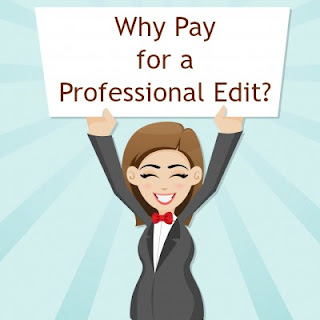Why Pay for a Professional Edit?
By Andrea Merrell
 A recent email from a potential client asking about my rates for editing ended with “I’m holding my breath.”
A recent email from a potential client asking about my rates for editing ended with “I’m holding my breath.”
I had to laugh because this is the way many—if not most—writers feel when it comes to paying for a professional edit. I certainly felt that way in the beginning of my writing career. I couldn’t imagine how someone could charge so much per hour to proofread and make corrections to my words.
How little I knew …
There’s much more that goes into a thorough (substantive) edit than simply looking for typos. Along with an eye for punctuation, grammar, and spelling, your editor will look up and verify Scripture references and check the meaning of unfamiliar words. He or she will double-check hyphenated words, quotes, facts, and rules in the CMOS (Chicago Manual of Style) and CWMS (Christian Writer’s Manual of Style). These are the go-to books for editors and are considered industry standard.
A good editor will also look for:
· Your writing style. Your editor should never try to change your voice. After all, this is your story.
· Formatting and consistency issues.
· Redundant words and phrases. Sometimes we tend to overuse certain words without realizing it. Your editor will help you catch these redundancies that can ruin your story and wear on the reader.
· Strong hooks. Using strong hooks will keep your readers turning the pages.
· How well you set the scene.
· POV (point of view) issues. Head-hopping will frustrate the reader.
· Dialogue issues. This will especially apply to speaker beats and tags.
· Showing, not telling. Your editor will help you put your reader in the scene and even inside the character’s head by showing external and internal conflict.
· Proper use of backstory.
· Syntax. This is the rhythm and flow of your sentences and paragraphs.
There are many other elements involved in the process, but this will give you a better idea of what to expect.
A professional editor can comfortably edit six to eight pages per hour. Best case scenario (a manuscript that requires less work) would be ten. Most editors will go through a manuscript at least twice and sometimes more. This depends on the quality of the writing and the amount of editing that needs to be done. It’s virtually impossible to catch every single mistake the first time through.
There are also notes for the author, e-mails, and (sometimes) phone calls.
 Alycia has done several posts over the past few months about how you can save money by learning the craft of writing and applying those rules to your projects. Here is the link to part 1: The More You Know, The Less You'll Pay. I would encourage you to go back over these posts and study each point. This information will help you submit a much cleaner manuscript that will require less time, effort, and—ultimately—dollars.
Alycia has done several posts over the past few months about how you can save money by learning the craft of writing and applying those rules to your projects. Here is the link to part 1: The More You Know, The Less You'll Pay. I would encourage you to go back over these posts and study each point. This information will help you submit a much cleaner manuscript that will require less time, effort, and—ultimately—dollars.
So, back to the question … why pay for a professional edit?
An editor’s job is to make you, the writer, look good … to make your words shine. This person keeps up with industry standards and plays a vital role in the quality and success of your project. Unfortunately, there are many poorly written books on the market today because the writers did not think it necessary to pay for a professional edit.
Next time, we'll talk about the team of writer and editor. In the meantime, what are your thoughts on professional editing? If you have a success story you’d like to share, we’d love to hear it.
(Photos courtesy of FreeDigitalPhotos.net/Stuart Miles/iosphere.)
TWEETABLES



Comments
Post a Comment